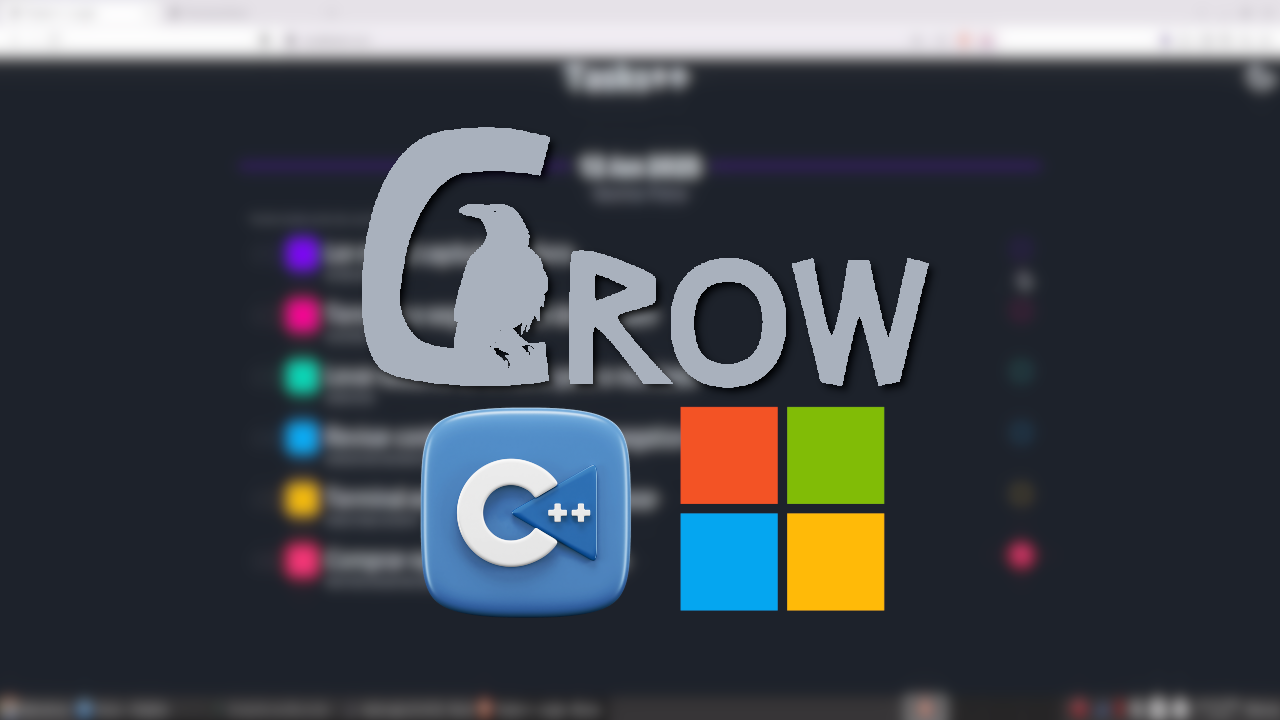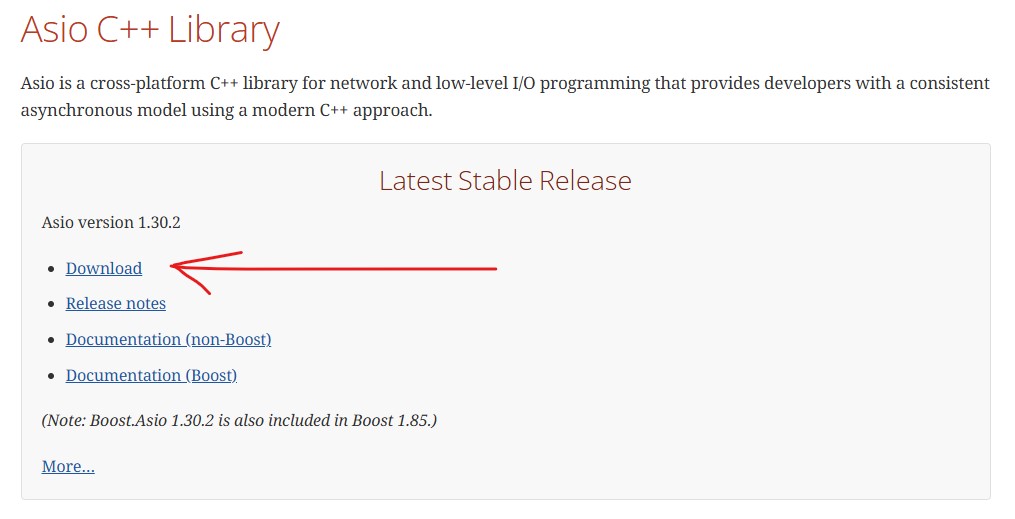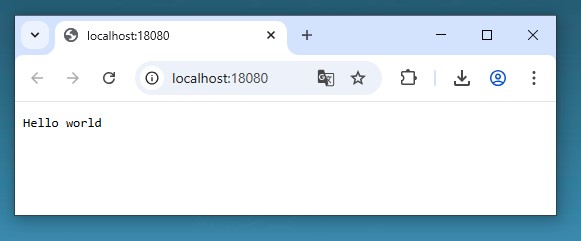
Crow C++ is a C++ framework for creating HTTP web services or Websockets. It uses routing similar to Flask from Python, making it easy to use.
For more information, watch the video we made about Crow.
The Crow documentation recommends using Conan or vcpkg, but these package managers for C and C++ are not very user-friendly, so…
In this article, we’ll see how to install and run Crow on Windows from scratch—and make it WORK!
📦 Dependencies
Before anything else, you’ll need the following tools installed on your system.
Click the links for installation tutorials on Windows.
Using WinGet, you can install them via PowerShell with these commands:
winget install --id Git.Git -e --source winget
winget install --id=Kitware.CMake -e
winget install --id=MartinStorsjo.LLVM-MinGW.UCRT -e
winget install -e --id Python.Python.3.11 --scope machine Only GCC requires following the tutorial.
Note: After installing it, there’s a CMake inside the
MinGWfolder. To ensure version compatibility, renamecmaketo something else.
Example: If you run Get-Command cmake in the terminal, it will show this path:
Get-Command cmake
CommandType Name Version Source
----------- ---- ------- ------
Application cmake.exe 4.0.1.0 C:\mingw64\bin\cmake.exe So, you need to rename it to ensure it uses the other installation (from Kitware). For example:
Rename-Item -Path "C:\mingw64\bin\cmake.exe" -NewName "DISABLED-cmake.exe" Now, when you run Get-Command cmake again, it should show the correct path: C:\Program Files\CMake\bin\cmake.exe and version:
Get-Command cmake
CommandType Name Version Source
----------- ---- ------- ------
Application cmake.exe 3.26.0.0 C:\Program Files\CMake\bin\cmake.exe With that done, let’s install Crow C++!
📥 Installing Crow
First, create a folder for your Crow project (e.g., on the Desktop) and navigate into it:
cd "$env:USERPROFILE\Desktop"
New-Item -ItemType Directory "MyProjectCrow"
Set-Location "MyProjectCrow" Crow depends on the ASIO library at compile-time and runtime, so download ASIO from this link:
Click the Download option as shown in the image:
The current version (as of this article) is
1.30.0, but if there’s a newer one, choose that.

-
You’ll be redirected to https://sourceforge.net/projects/asio/files/asio/1.30.2.
-
On SourceForge, download asio-1.30.2.zip.
-
After downloading, extract it (
Extract Here), which will create a folder namedasio-1.30.2. Rename it to justasio. -
Cut this
asio/folder and paste it inside your project.
Now, inside your MyProjectCrow folder, clone the Crow repository:
git clone https://github.com/CrowCpp/Crow Move the asio folder from your project (MyProjectCrow) into the cloned Crow folder:
Move-Item -Path "asio" -Destination "Crow" Then navigate into the Crow folder:
cd Crow 🛠️ Now Let’s Compile Crow Along with ASIO
I organize all my includes in a folder on the C:\ drive, similar to how Unix uses /usr/include. On Windows, I store everything (SFML3, SFML2, tmxlite, FFmpeg, etc.) in C:\Includes.
So, create this folder and a subfolder C:\Includes\crow with this command, as we’ll install Crow and ASIO there:
New-Item -Path "C:/Includes/crow" -ItemType Directory Now, still inside the Crow folder in your project, compile with this command:
Note the dot (
.) at the end—it’s important!
cmake -G "Unix Makefiles" -B build -DCMAKE_INSTALL_PREFIX="C:/Includes/crow" -DASIO_INCLUDE_DIR="./asio" -DCMAKE_CXX_FLAGS="-I./asio" -DCROW_BUILD_EXAMPLES=OFF -DCROW_BUILD_TESTS=OFF . The output should look something like this:
-- The CXX compiler identification is GNU 15.1.0
-- Detecting CXX compiler ABI info
-- Detecting CXX compiler ABI info - done
-- Check for working CXX compiler: C:/mingw64/bin/c++.exe - skipped
-- Detecting CXX compile features
-- Detecting CXX compile features - done
-- No build type selected, default to Release
-- Found Python3: C:/Program Files/Python311/python.exe (found version "3.11.9") found components: Interpreter
-- Found asio: C:/Users/USERNAME/Desktop/MyProjectCrow/Crow/asio
-- Configuring done (13.6s)
-- Generating done (0.0s)
-- Build files have been written to: C:/Users/USERNAME/Desktop/MyProjectCrow/Crow/build This --build step is almost insignificant (it doesn’t generate files), but run it just in case:
cmake --build build Now, install:
cmake --install build It will move files to these paths:
-- Install configuration: "Release"
-- Installing: C:/Includes/crow/include
-- Installing: C:/Includes/crow/include/crow
-- Installing: C:/Includes/crow/include/crow/app.h
-- Installing: C:/Includes/crow/include/crow/ci_map.h
-- Installing: C:/Includes/crow/include/crow/common.h
-- Installing: C:/Includes/crow/include/crow/compression.h
-- Installing: C:/Includes/crow/include/crow/exceptions.h
-- Installing: C:/Includes/crow/include/crow/http_connection.h
-- Installing: C:/Includes/crow/include/crow/http_parser_merged.h
-- Installing: C:/Includes/crow/include/crow/http_request.h
-- Installing: C:/Includes/crow/include/crow/http_response.h
-- Installing: C:/Includes/crow/include/crow/http_server.h
-- Installing: C:/Includes/crow/include/crow/json.h
-- Installing: C:/Includes/crow/include/crow/logging.h
-- Installing: C:/Includes/crow/include/crow/middleware.h
-- Installing: C:/Includes/crow/include/crow/middlewares
-- Installing: C:/Includes/crow/include/crow/middlewares/cookie_parser.h
-- Installing: C:/Includes/crow/include/crow/middlewares/cors.h
-- Installing: C:/Includes/crow/include/crow/middlewares/session.h
-- Installing: C:/Includes/crow/include/crow/middlewares/utf-8.h
-- Installing: C:/Includes/crow/include/crow/middleware_context.h
-- Installing: C:/Includes/crow/include/crow/mime_types.h
-- Installing: C:/Includes/crow/include/crow/multipart.h
-- Installing: C:/Includes/crow/include/crow/multipart_view.h
-- Installing: C:/Includes/crow/include/crow/mustache.h
-- Installing: C:/Includes/crow/include/crow/parser.h
-- Installing: C:/Includes/crow/include/crow/query_string.h
-- Installing: C:/Includes/crow/include/crow/returnable.h
-- Installing: C:/Includes/crow/include/crow/routing.h
-- Installing: C:/Includes/crow/include/crow/settings.h
-- Installing: C:/Includes/crow/include/crow/socket_acceptors.h
-- Installing: C:/Includes/crow/include/crow/socket_adaptors.h
-- Installing: C:/Includes/crow/include/crow/task_timer.h
-- Installing: C:/Includes/crow/include/crow/TinySHA1.hpp
-- Installing: C:/Includes/crow/include/crow/utility.h
-- Installing: C:/Includes/crow/include/crow/version.h
-- Installing: C:/Includes/crow/include/crow/websocket.h
-- Installing: C:/Includes/crow/include/crow.h
-- Installing: C:/Includes/crow/lib/cmake/Crow/CrowTargets.cmake
-- Installing: C:/Includes/crow/lib/cmake/Crow/Findasio.cmake
-- Installing: C:/Includes/crow/lib/cmake/Crow/CrowConfig.cmake You also need to move the asio/ folder from Crow/ to C:\Includes\:
Move-Item -Path "asio" -Destination "C:\Includes\" Finally, exit the Crow folder and delete the cloned repository:
cd ..
Remove-Item -Path "Crow" -Recurse -Force Done! Now let’s test our project!
⚙️ Running a Hello, World! Server with Crow
Now your MyProjectCrow folder is empty. Let’s create a main.cpp file inside it (e.g., using VSCode):
code main.cpp Paste this inside:
#include "crow.h"
int main(){
crow::SimpleApp app;
CROW_ROUTE(app, "/")([](){
return "Hello world";
});
app.port(18080).multithreaded().run();
} Save the file, return to the terminal, and compile your project with this command:
Confirm these paths, as you may have subfolders. Inside
asio, there should be anincludefolder:C:/Includes/asio/include.
g++ main.cpp -I"C:/Includes/asio/include" -I"C:/Includes/crow/include" -lws2_32 -lmswsock -o app.exe This will generate .\app.exe. Run it:
You’ll see this:
.\app.exe
(2025-06-20 03:58:29) [INFO ] Crow/master server is running at http://0.0.0.0:18080 using 2 threads
(2025-06-20 03:58:29) [INFO ] Call `app.loglevel(crow::LogLevel::Warning)` to hide Info level logs. It suggests accessing http://0.0.0.0:18080 in your browser, but this may fail. Instead, visit:
http://localhost:18080
The address
0.0.0.0is a placeholder meaning “all network interfaces”—so the server listens on all your computer’s interfaces, but it’s not a valid IP to access directly in a browser.
You’ll see this message in the browser:

To stop the server, press
Ctrl + Cin the terminal.
Everything is working!
I’ve been doing many things with Crow, like this Tasks++/ToDO++ using Crow C++, Databases, HTMX, and TailwindCSS:
🎥 Watch the Video
For more information, visit:
webdev windows cpp crowcpp web




